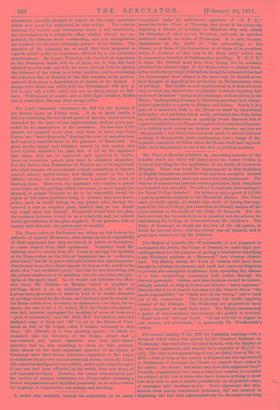The Lord Chancellor introduced his Bill for the Reform of
the Patent Laws on Friday week. It is, to speak briefly, a Bill for restricting the too lavish grant of patents, which are now conceded for the most trivial improvements, and are never pre- ceded by an examination of the invention. No less than 4,500 patents are granted every year, and most of them, says Lord Cairns, are "mere drag-nets," limiting the area of manufactures, and exposing manufacturers to the payment of black-mail. So great are the injury and irritation caused by this system, that Lord Cairns defended his plan first of all by the argument that unless they can be improved, and improved by restric- tions on inventors, patent laws must be abolished altogether. For the future, four Examiners of Patents are to be appointed, who shall examine all new patents, consult committees of experts, compel minute specifications, and finally report to the Law Officers whether an invention deserves a patent for seven or fourteen years. Moreover, the applicant who obtains a patent must either-use his privilege within two years, so as to supply the demand, or permit licensees to do so on reasonable terms, the object of this latter provision being to prevent injurious mono- polies, such as would belong to any person who, having dis- covered a way to toughen glass, insisted that no one should sell tough glass but himself. Everybody would want his glass, the ordinary factories would be at a standstill, and yet nobody would get sufficient of the glass required. If the patentee fails to comply with this rule, the patent may be recalled.


































 Previous page
Previous page